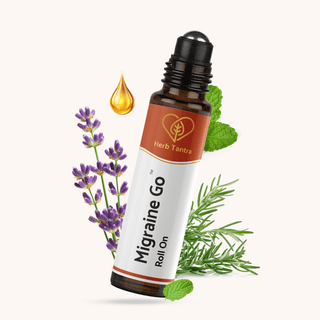We’ve all been there - lying in bed after a long day, eyes heavy, body tired—yet sleep refuses to come. Insomnia and restless nights affect millions of people worldwide, and in India alone, growing stress, digital overload, and changing lifestyles have made sleeplessness a common health concern. If you’ve ever asked yourself, “Why can’t I fall asleep even when I’m tired?”, you’re not alone. Let’s explore the real reasons behind sleep struggles, how anxiety plays a role, and the natural remedies that can help you drift into restful slumber.
Why Can’t I Fall Asleep Even When I’m Tired?
Difficulty falling asleep despite exhaustion is one of the most common signs of insomnia. This happens because the body and mind aren’t always in sync. While your muscles may feel fatigued, your brain might still be on overdrive. Common reasons include -
- Sleep anxiety and racing thoughts that prevent your mind from switching off.
- Irregular sleep schedules that confuse your body’s circadian rhythm.
- Overexposure to blue light from phones or laptops before bedtime.
- Caffeine, alcohol, or late-night heavy meals, which interfere with natural sleep signals.
Ayurveda teaches that an overstimulated mind (rajasik state) and weakened nervous system can disrupt sleep. Addressing both the body and the mind is key to long-term relief.
How Many Hours of Sleep Do You Really Need?
A healthy adult should ideally aim for 7–9 hours of quality sleep per night. While the exact number varies depending on age, activity level, and overall health, consistently sleeping less than 6 hours can raise the risk of anxiety, low immunity, and chronic health issues.
In Ayurveda, sleep (nidra) is considered one of the three pillars of health, alongside diet (ahara) and lifestyle (vihara). Deep, uninterrupted sleep allows the body to restore tissues, balance hormones, and regulate emotions—making it just as essential as food and exercise.
What is Sleep Anxiety—and How Does It Affect Insomnia?
Sleep anxiety is the fear of not being able to sleep. Ironically, the more you worry about sleep, the harder it becomes to achieve it. This vicious cycle can cause -
- Racing thoughts before bedtime, making it impossible to relax.
- Anticipatory stress, where you start worrying about tomorrow’s fatigue.
- Increased heart rate and cortisol levels, which keep the body alert instead of winding down.
Many people report lying awake with “what if” thoughts—What if I don’t sleep tonight? What if I feel terrible tomorrow? This mental chatter is a leading contributor to insomnia.
Do Meditation, Journaling, and Natural Remedies Help?
Yes—mind-body practices and gentle rituals can significantly improve sleep quality -
- Meditation and breathwork calm the nervous system, reducing nighttime anxiety.
- Journaling before bed helps unload stressful thoughts so the mind feels lighter.
- Stimulus control and sleep restriction (common behavioral therapies) teach the body to associate bed only with sleep, not with scrolling or worrying.
For additional support, Ayurvedic-inspired remedies can be deeply effective. Herb Tantra’s Sleep Better Range blends modern convenience with ancient wisdom -
- Sleep Buddy Roll On (Valerian Root, Bergamot, Chamomile) - a stronger blend that helps you fall asleep faster. Roll onto wrists, behind ears, or the soles of your feet.
- Zznooze Roll On (Lavender, Cedarwood, Mandarin) - a lighter, everyday solution that improves sleep quality gently.
- Sleep Buddy Herbal Tea (Valerian Root, Spearmint, Ashwagandha, Rose Petals): a soothing nighttime ritual that calms the mind and promotes deep rest.
Together, these small practices can transform bedtime into a nourishing ritual instead of a stressful struggle.
How Sleep Hygiene and Bedroom Environment Affect Sleep
Your environment is just as important as your state of mind. Simple lifestyle adjustments—known as sleep hygiene practices—can make a big difference:
- Set a fixed sleep-wake schedule, even on weekends.
- Limit screen time an hour before bed—swap scrolling for reading or herbal tea.
- Keep your bedroom cool, dark, and quiet. Even mild light or noise can interrupt deep sleep.
- Use calming scents like lavender or chamomile to create a bedtime cue for relaxation.
By aligning your habits with your body’s natural rhythms, you create conditions where sleep comes easily, instead of being forced.
Final Thoughts
Sleep struggles can feel overwhelming, but the body has a natural ability to heal and restore balance. With mindful lifestyle shifts, gentle Ayurvedic remedies, and calming practices, insomnia doesn’t have to control your nights. Instead, you can turn bedtime into a ritual of rest, stillness, and self-care—allowing you to wake up refreshed, energized, and ready for the day ahead.
FAQs on Sleep and Insomnia
1. Why do I wake up at 3 AM and can’t fall back asleep?
This is often linked to stress, hormonal imbalances, or an overactive mind. Practicing relaxation techniques or sipping herbal tea may help.
2. Can anxiety really cause insomnia every night?
Yes. Anxiety raises stress hormones like cortisol, making it harder to relax. Calming rituals and Ayurvedic herbs can support better sleep.
3. How does blue light affect sleep quality?
Blue light from phones or laptops delays melatonin release, tricking the brain into staying awake. Avoid screens 1–2 hours before bedtime.
4. What is the best natural remedy for sleep problems?
Ayurvedic herbs like Valerian Root, Chamomile, Ashwagandha, and Lavender are known to calm the nervous system and improve sleep naturally.
5. Can changing my bedroom environment really improve insomnia?
Yes. A cool, dark, and quiet bedroom helps your body release melatonin, making it easier to fall and stay asleep.

















